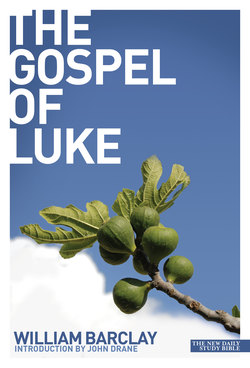Читать книгу Gospel of Luke - William Barclay - Страница 24
На сайте Литреса книга снята с продажи.
ОглавлениеA DREAM REALIZED
Luke 2:25–35
Now – look you – there was a man in Jerusalem called Simeon. This man was good and pious. He was waiting for the comforting of Israel and the Holy Spirit was upon him. He had received a message from the Holy Spirit that he would not see death until he had seen the Lord’s Anointed One. So he came in the Spirit to the Temple precincts. When his parents brought in the child Jesus, to do regarding him the customary ceremonies laid down by the law, he took him into his arms and blessed God and said, ‘Now O Lord, as you said, let your servant depart in peace, because my eyes have seen your instrument of salvation, which you have prepared before all the people, a light to bring your revelation to the Gentiles, and the glory of your people Israel.’ His father and mother were amazed at what was said about him. Simeon blessed them and said to Mary his mother, ‘Look you, this child is appointed to be the cause whereby many in Israel will fall and many rise and for a sign which will meet with much opposition. As for you – a sword will pierce your soul – and all this will happen that the inner thoughts of many hearts may be revealed.’
THE Jews regarded their own nation as the chosen people, but they saw quite clearly that by human means their nation could never attain to the supreme world greatness which they believed their destiny involved. By far the greater number of them believed that because the Jews were the chosen people they were bound some day to become masters of the world and lords of all the nations. To bring in that day some believed that some great, celestial champion would descend upon the earth; some believed that there would arise another king of David’s line and that all the old glories would revive; some believed that God himself would break directly into history by supernatural means. But in contrast to all that, there were a few people who were known as the Quiet in the Land. They had no dreams of violence and of power and of armies with banners; they believed in a life of constant prayer and quiet watchfulness until God should come. All their lives they waited quietly and patiently upon God. Simeon was like that; in prayer, in worship, in humble and faithful expectation he was waiting for the day when God would comfort his people. God had promised him through the Holy Spirit that his life would not end before he had seen God’s own anointed king. In the baby Jesus he recognized that king and was glad. Now he was ready to depart in peace and his words have become the Nunc Dimittis, another of the great and precious hymns of the Church.
In verse 34 Simeon gives a kind of summary of the work and fate of Jesus.
(1) He will be the cause whereby many will fall. This is a strange and a hard saying but it is true. It is not so much God who judges us; we judge ourselves; and our judgment is our reaction to Jesus Christ. If, when we are confronted with that goodness and that loveliness, our heart runs out in answering love, we are within the kingdom. If, when so confronted, we remain coldly unmoved or actively hostile, we are condemned. There is a great refusal just as there is a great acceptance.
(2) He will be the cause whereby many will rise. Long ago Seneca said that what people needed above all was a hand let down to lift them up. It is the hand of Jesus which lifts us out of the old life and into the new, out of the sin into the goodness, out of the shame into the glory.
(3) He will meet with much opposition. Towards Jesus Christ there can be no neutrality. We either surrender to him or are at war with him. And it is the tragedy of life that our pride often keeps us from making that surrender which leads to victory.
